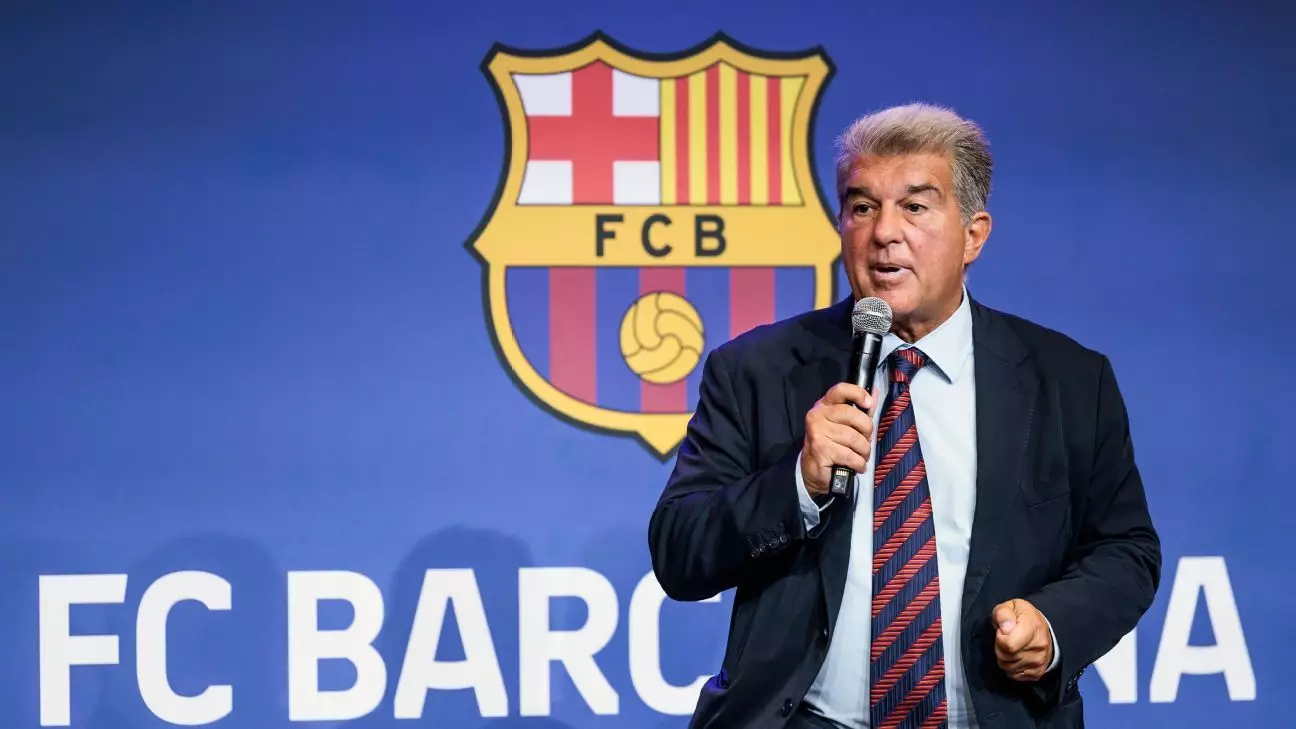Barcelona’s tumultuous football scene has taken a dramatic turn following a controversial mishap involving the registration of players Dani Olmo and Pau Víctor. The intense backlash against president Joan Laporta is not only a reflection of the club’s internal struggles but also signals deeper discontent among significant factions of its supporter base. This article delves into the ongoing dissent, the reasons behind it, and the potential implications for Barcelona’s leadership and future.
A coalition of ten opposition groups, prominently spearheaded by Victor Font’s SÍ al Futur and Joan Camprubí Montal’s Som un Clam, has emerged as a formidable voice calling for Laporta’s resignation. Their collective discontent stems not merely from the immediate issue of player registration but rather a broader perception of negligence and poor governance under Laporta’s leadership. The fact that such a wide array of supporters’ groups has united speaks volumes about the dissatisfaction rippling through the club’s fan base.
The controversial failure to register Olmo and Víctor has become emblematic of the larger concerns regarding Laporta’s management. This event has triggered discussions about the accountability of leadership in high-stakes scenarios. Supporters assert that for a club as prestigious as Barcelona, these errors are inexcusable. The grassroots sentiment culminated in a formal statement, giving Laporta a stark ultimatum: resign or face a no-confidence vote, a move that could significantly disrupt his current mandate, which runs until 2026.
While the player registration fiasco is at the forefront of the conflict, it is crucial to understand the contributing issues that have exacerbated the situation. Critics point to several decision-making missteps, including the contentious renewal deal with Nike that involved exorbitant commissions to third parties. The financial dealings surrounding the sale of VIP seats for the next 20 years, amounting to €100 million, have also raised eyebrows. This indicates a perceived mismanagement of funds that has not only affected the club’s financial health but also raised ethical questions about transparency.
Additionally, the controversial decision to close the singing section at the Olympic Stadium amid disputes with supporters represents a growing divide between the administration and the fan base. These actions have compounded calls for change, as many see them as indicative of a regime that has lost touch with the club’s core values and its supporters.
The legal repercussions of the registration disaster further complicate matters. As Barcelona has officially appealed the ruling by LaLiga and the Spanish Football Federation that declared Olmo and Víctor ineligible for re-registration, the club is in a precarious situation. The management’s confidence in overturning this decision through legal channels should indeed raise questions. The club argues that extenuating circumstances (force majeure) hindered their ability to complete the registration process on time, citing the same for the delayed sale of VIP boxes.
Yet, the situation is fraught with risks. Both Olmo and Víctor have clauses allowing them to leave for free if not cleared for the second half of the season, which adds pressure on the administration to resolve this issue swiftly or risk losing valuable talent. While sources close to the players indicate that they are currently not considering a departure due to their long-standing connection with the club, frustrations are palpable among them regarding the handling of their situation.
As the ongoing standoff continues, it becomes evident that Laporta’s presidency is at a critical juncture. The ramifications of this crisis extend beyond immediate player eligibility and touch on the very essence of what it means to lead a club with the legacy of Barcelona. The factions calling for his resignation are not merely echoing their grievances but are advocating for a vision of governance that prioritizes accountability, transparency, and respect for the supporters.
This uproar forces a reconsideration of existing leadership philosophies within the club. Ultimately, how Laporta responds to these challenges and the subsequent actions of Barcelona’s board will determine not only his future but also the club’s direction and reputation in an increasingly competitive landscape. The repercussions of these events will undoubtedly echo through the annals of the club’s storied history.

